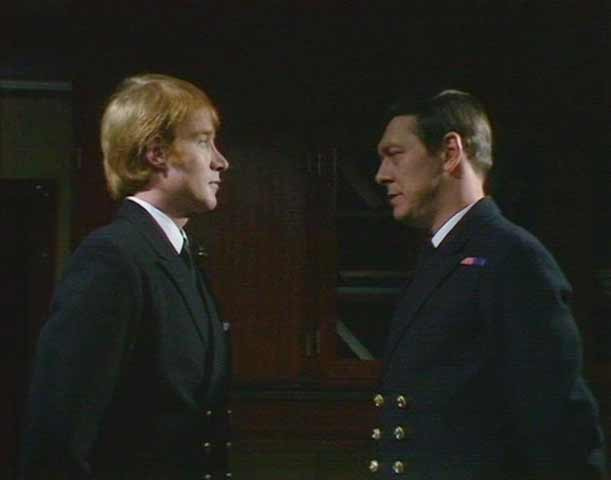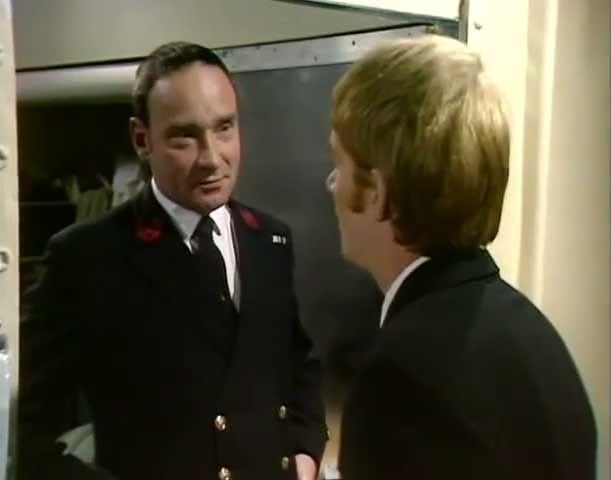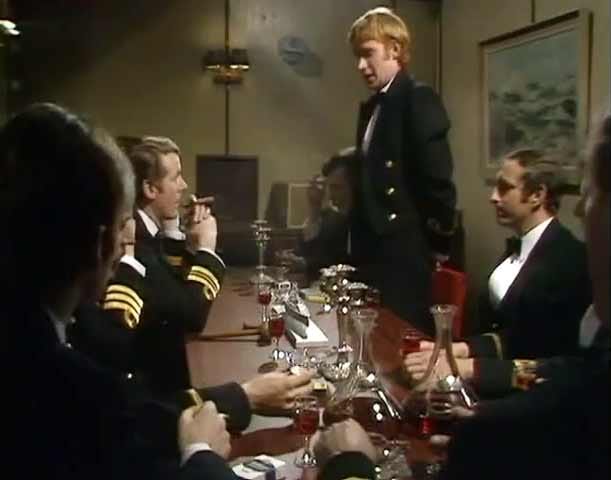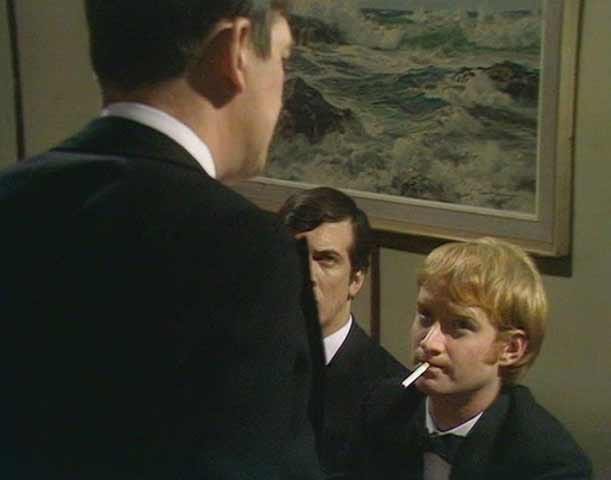The 1970s British TV drama Warship has an episode called The Immortal Memory. I would highly recommend watching it.
Written by series creator Ian Mackintosh, the episode tackles the clash between an old institution full of traditions and hierarchy, with modern values of equality, rationalism and liberalism. The latter are embodied by one character, Timothy Penn, a new recruit into the officer class, beginning his service on a Royal Navy frigate.
Penn joined the Navy as a cadet then went, with the Navy’s financial help, to university at Cambridge. Early in his time there, he and several friends became political radicals. Of the Navy, he now says:
It’s rubbish. Outmoded claptrap. They go through all this sunset ceremony to get the ensign down. In the morning they have another ceremony to put it up again.
This, like all of the Navy’s traditions, strikes Penn as meaningless pomp and ceremony. He is infuriated by the compulsion to do irrational and unnecessary things. Many of the Navy’s rules and conventions serve no practical purpose. Instead of recognising that they add up to a unique culture which nourishes and motivates the men, Penn sees them as a sort of ritual humiliation. Furthermore, it is all in service to an institution which he sees as obsolete and absurd.
Penn is only serving due to legal obligation. The Navy paid for his Cambridge education; in return he must serve five years at sea. If he reneges on this agreement, he will have to pay back the money. However, if he is deemed unsuited for service, he will be released from all obligations.
So, having arrived on ship, he immediately sets about proving himself unsuited for service. He voices contempt for the hierarchy of the Navy and the traditions which sustain it. He mocks officers for getting excited about such things. He openly flouts rules. He questions everything.
While the latter could be (and is initially seen as) a virtue, here it is a sign of threat. Penn is a man who wants, not to improve, but to destroy - and who uses the former pretence to disguise the latter intent (typical of progressives and Communists).
His nemesis is soon found in Lt Cmdr Beaumont, a natural conservative, and one steeped in the Navy’s history and devoted to the institution. (Like Beaumont, writer Mackintosh came from a Navy family and joined up as soon as he could, straight out of school. It is possible that Beaumont is his “avatar” in the series, and in this episode is speaking Mackintosh’s true views while he, writing, presents a more neutral treatment via the other characters.)
Beaumont quickly develops contempt for Penn, sees what his game is, and tells him “you won’t win”.
Intervening between Penn and Beaumont is the ship’s captain, Cmdr Nialls. He is determined to be reasonable, consider both sides, see the bigger picture, etc.
Even while Beaumont tells him of Penn’s bad behaviour and surly attitude, Nialls doesn’t accept his opinion of the young upstart. Something in him compels him to doubt, and to give the benefit of the doubt. To be fair to Nialls, this is partly pragmatic. Getting rid of Penn, who is a talented engineer, would lose the Navy that talent, and would mean it had wasted a lot of money educating him. But Nialls’ other reason is an excess of kindness. When Beaumont stresses to him that Penn doesn’t care about the Navy or his debt to it, Nialls replies:
Make him care. Motivate him. Help him. Above all, try to understand him.
Nialls and Beaumont represent two types of conservative: one who should be an organiser (Nialls) and one who should be king (Beaumont). Unfortunately, here they are the wrong way around.
Nialls is a capable leader, a good practical man, but this disposition means he cannot recognise an existential threat as being such. Beaumont recognises it instinctively. He knows that “being reasonable” is futile, because the threat is not interested in being reasonable, only in winning. The game is zero-sum, because the threat demands that. It will not acquiesce to being proven wrong, nor allow itself to be “won around” to your way of thinking; those options are disallowed by the threat’s very nature.

Penn doesn’t merely want to get kicked out of the Royal Navy. He wants to abolish it - as we will learn later. He despises the Navy, the men in it, and the character traits which brought them to it.
No man better embodies those traits than Lt Cmdr Beaumont. This is immediately recognised by Penn, who fixes on him as his “target”. He tells his girlfriend that he will “bring down Beaumont”. By any sane reckoning, Beaumont is a very good and decent man. The desire to “bring down” such a man marks Penn as a sheer wretch.
This is where we see that political motives might be genuine, but have, themselves, psychological motives. After all, Penn’s goal (to get kicked out of the Navy) could be achieved without harming Beaumont at all. So the personal loathing that he develops for him is unnecessary, and involuntary - it is “pre-political”.
I think Penn wants to “bring down” Beaumont because he embodies traits that Penn lacks: loyalty, honour, humility, duty, and romance. Penn mocks these traits, but really he knows they are good - so his political radicalism is actually a way for him to dignify being maladjusted.
(That is my reading. The episode is more charitable towards Penn, perhaps because Mackintosh sees progressivism as a historical inevitability, whereas I see it as a psychological aberration, even if it is “enabled” by the sweep of history.)
There is a good scene between Penn and his immediate superior, Lt Cmdr Kiley. It is short, but gives useful insight into Penn’s personality.
Kiley is a senior officer, experienced and wise, and he encourages Penn to make a go of it in the Navy. He says that a stint of five years provides great opportunities to learn rare skills and improve one’s employment prospects. When Penn complains that the ship is “packed with rules and regulations”, Kiley explains:
It’s an enclosed community. It needs laws in order to function.
The idea that this might be true, and good, and that these laws might have arisen over centuries of experience, is of no interest to Penn. He replies:
I don’t [need laws]. I’m my own person.
Kiley says something very insightful, illustrating that the adolescent notion of total autonomy is just a fantasy:
No-one is his own person. We all have loyalties and obligations.
Not stopping to think whether that is true, Penn immediately says:
Not me.
Notice that he doesn’t regret having no loyalties or obligations.
Kiley suggests that he is, in any case, mistaken:
Well, you have ties with [your girlfriend] Zimba.
Zimba is a beautiful, charming, intelligent and well-bred young woman, so Kiley expects that Penn will value her. But in fact she is:
Nothing I can’t live without.
Rather than rebuke Penn for shallowness and failure to recognise another person’s value, Kiley makes a broader point:
So it’s not the Navy you’re against. It’s the world.
Penn chuckles:
You could be right.
What is shown here, again, is that Penn’s political beliefs are rooted in psychological traits: a stunted desire to be free of all obligations. His Marxist education has “dialled in” to this drive and amplified it.
Of course, it is common for young men to be “against the world”. But Penn is at least 22 and should be starting to grow out of that, especially after a solid education at Cambridge. And here we get to the problem of national decline, with the fish rotting from the head. Penn’s elite education, far from inducting him into the great traditions of his country and imbuing him with a love for those traditions and that country, has turned him against those things. It has sought in him and cultivated the seeds, not of loyalty and love, but of misfittery and egotism.
(How ironic that Penn considers everyone around him “brainwashed”, but not himself. But that is how subversion works. It flatters the receiver that, in accepting the indoctrination, he is thinking for himself, unlike those dullards who reject exotic new ideas.)
Penn is not made likeable in the story - indeed, he is detestable - so you might expect that, by the end, he will be “defeated”.
Indeed, at times I dearly hoped he would get a beating for his insolence. But the officers cannot behave in such an ungentlemanly way, nor can they quietly invite the lower ranks to do the deed for them. Either of those paths would undermine the hierarchy. (Penn is protected by the very hierarchy that he despises!) So Penn cannot be given the treatment he deserves.
But neither is he defeated intellectually. This could happen. The arguments against him (both political and psychological) are all there, voiced by Beaumont, but they are under-deployed. The reason for this is the liberal disposition of the man at the top, Nialls. He believes that, in a changing world, the Navy can’t afford to be brittle. It can’t just ignore or crush progressive reformers like Penn, because they are emerging from the universities in huge numbers. (How ironic, but how typical, that the Navy pays for education which turns people against it!) As Penn says, these graduates will soon populate government, politics and media, so Nialls believes that the Navy (like all traditional institutions) has no choice: it must listen to these progressives and reach some kind of agreement with them.
In the real world, in the 51 years since this episode was made, Nialls has been proven right. But, because conservatives always took his weak approach, the “discussion” has been completely one-sided. There has been no “agreement” reached. Instead, progressives have simply swarmed into every position of power, eliminated their conservative rivals, refused to promote or employ conservatives, and then set about making conservatism effectively illegal. Then, they have subverted the traditional institutions by force and in a particularly grotesque manner.
The Navy, for example, has been allowed to keep its quaint little traditions (which so aggravated Penn) but forced to corrupt them with LGBT, diversity, equality and feminism. Traditions are actually very useful for progressives, because people care about them and therefore corrupting them packs a huge psychological punch. So you don’t abolish a tradition; you pervert it. You keep the raising of the ensign but you have a transgender man doing it. You keep the hierarchy but have it preach equality. You keep the national iconography but have it defend globalism. You keep the border force but have it ferry people across the border.
Also, traditional institutions have been forced to rewrite their own history in line with current thinking, which means that the people naturally attracted to such institutions find themselves at odds with the way they now conceive of themselves. Everyone is alienated from the things they would naturally love and serve. The Beaumonts would not fit in with today’s Royal Navy; the Penns transformed it while the Nialls appeased them, with, by the year, ever less leeway to oppose them.
Beaumont is an efficient and dedicated officer in the Royal Navy because he loves it as an institution. “Love” is not too strong a word.
He and the other officers note the imminent anniversary of the Battle of Trafalgar. Then Beaumont excitedly realises that, with a small course adjustment, the ship could pass over the actual site of the battle on the anniversary. The adjustment would lengthen the voyage by one day, but Cmdr Nialls agrees it would be worth it.
There will be two simultaneous dinners to honour the anniversary: one for the petty officers, one for the officers. The latter will be hosted by Beaumont, and Nialls will give a speech.
At first, Penn smugly mocks the idea of celebrating something that happened 170 years ago. But when he learns that the voyage is being needlessly extended to do so, and that he will be obliged to attend the officers’ dinner, he is outraged. First he complains to Beaumont. When that gets him nowhere, he looks into agitating dissent among the lower ranks.
Interestingly, the man who warns him against doing this is not an officer but the Master at Arms. Heron is a working-class man who understands the value of the Navy’s traditions: they inspire the lower ranks. He also understands the value of hierarchy: it makes the lower ranks (indeed, all ranks) excel, because it gives them roles to fulfil, standards to live up to.
Heron correctly sees that Penn is not only a class traitor but a predator, willing to subvert those who look up to him so that he can use them against his peers for personal gain, or ego gratification. (Just look at the WEF types today, crowing about equality and the evils of privilege, while treating the working-class with genocidal contempt.)
By the time of the dinner, Beaumont is so exasperated by Penn’s behaviour and concerned about the danger he poses to crew morale and operations aboard ship, he decides to force things to a head. Before asking Nialls to give his speech, he invites Penn, as the newest and youngest officer aboard, to say a few words about what the Battle of Trafalgar “means to him”.
Penn hesitates, knowing he is being put on the spot, but decides to go ahead. He stands up.
He thinks for a few seconds, then begins speaking:
We all know what the pigeons do to Nelson’s Column in Trafalgar Square, and I think the pigeons have the right idea and the right attitude towards those traditions which beset not only the Navy but the country in general.
He addresses the officers:
The trouble with our country, the trouble with the Navy, is that it is backward looking. You cling to Trafalgar, because it was a glory, and there are no glories in your lives today. You cling to tradition, because without the pomp and mystique of past days, you are nothing more than a sore on the face of a thinking society.
Note Penn’s appeal here to rationalism. In the manner of someone born after 1945, he believes that Western society has turned an epochal corner and embraced an ethos so superior to the past that it makes our ancestors and their achievements irrelevant. This new ethos is based on logic, reason, rationality - not superstition or romance or silly ideas like “nations”. And of course, once a society becomes “thinking”, it has no need for armed force. (Inevitably, then, our ancestors were unthinking - just contemptible morons. This is proven by the standard Penn has set up for them, a standard they can only fail, a standard which automatically makes him better than them.)
He continues:
Gentlemen, you are war-lovers without a war, an echo of generations best forgotten. The new generation, my generation, does not want you, has no need of you.
Penn’s contempt encompasses every traditional institution, but as seen here, he has a specific rationale for despising the armed forces. He believes (or pretends to believe) they are a superfluous relic, since “the new generation” believe in peace, not war.
This means progressive beliefs are, by default, decadent “luxury beliefs”, since they depend on supreme safety. The delusion is:
We can afford to be weak, lazy, vulnerable… because we are profoundly safe and secure. If we don’t make dangers [by guarding against them] then there won’t be any dangers [except, of course, for the dangers of being intolerant, or traditional, or bigoted, or hierarchical, or conservative…]
The obvious retort, which remains true despite being so obvious, is:
What happens when people show up who don’t share your progressive beliefs, and want to wipe you out?
Penn’s beliefs do not merely enable such people to attack us, but actually bring them into our very midst. The belief that we are safe by default and not by hard-earned exception, is the mother of perhaps all danger, and certainly the most insidious forms of it.
But Penn is intelligent, so he concedes that war may come - but he says that, if it does, his generation will be pacifist:
Now there may be another war, but we shall not fight in it. Surely it is better to be alive under foreign domination than dead as a result of going to war?
He considers this a virtuous sentiment, but it is actually a grossly egotistical one. What it means is that he is so unattached to his country and culture and people, he would not risk himself to defend them and would surrender to domination. This is cowardice masquerading as courage, nihilism as nobility. Typical of the post-war British, Penn is not devoted to anything greater than himself (just as he earlier told Kiley) and is therefore a slave to his own ego. And yet, he will firmly believe he is virtuous.
Penn concludes with a stark note of condescension to the seasoned officers around him:
Nelson is dead, war is dead.
He sits down. The officers exchange awkward glances. Everyone is uncomfortable. Penn has ruined the dinner, deflated the anniversary, denigrated the Navy, and insulted them all.
Beaumont now invites Cmdr Nialls to give his speech.
Wearily, Nialls stands up. He takes out the notes he had prepared, but decides to discard them and speak off-the-cuff in answer to Penn. Given the insult to everyone present and the Navy itself, as captain he feels he must respond.
But, like a cucky conservative, he tries to be conciliatory. He says that, if Nelson were to hear Penn’s words, he would be “much encouraged” by them. After all, he himself was an independent thinker. Nialls makes that case with some examples of Nelson “breaking with tradition”. But then he says that, while an innovator, Nelson was driven by patriotism, duty and honour.
Penn knows that Nialls is trying to persuade him, so he begins interjecting with snide one-word retorts, making clear that he is implacable.
Exasperated, Nialls says:
Sub-lieutenant Penn claims that war is dead. Let us hope so, for it is our task to keep it dead, to be prepared to defend our lifelines against the aggression that is human nature… in all generations.
Aggression is simply part of human nature. The perennial threat of attack from outside is a reality no matter what ideas we ourselves hold.
But of course, Penn has already covered this. War may come again, but he and his generation will not fight, they will nobly submit to “foreign domination”. Nialls has no answer for that, perhaps because it is more despicable than his naive conservatism can handle.
(In the real world, when Penn’s generation attained the power he craves, they adopted a much more pragmatic answer to the threat of attack from outside: globalism. This fits with the mentality of Penn, who feels no loyalty to or fondness for his country. That would be irrational.)
After another bit of insolence from Penn, Nialls finally gives the nod to Beaumont, who orders him to leave the dinner immediately.
The gathering ends solemnly - the bearers of tradition feeling their task rather tarnished now.
Beaumont and Nialls have an emergency meeting. Nialls is furious with Beaumont for inviting Penn to speak. Beaumont says it was necessary, to show Nialls “what I’m up against”.
Even after what has happened, Nialls isn’t quite ready to condemn Penn. He begins saying that he is a typical young man. Beaumont barks:
He’s not typical of anything, sir! He’s a misfit! He’s a pseudo-intellectual! He talks in clichés because he hasn’t got an original thought in his head, and he’s got to go!
Nialls sighs:
If he goes, we’ve failed.
Beaumont shows the guts to do what is right. He says that, if Penn stays, he will ask to be transferred to a different ship. He is not prepared to participate in the degradation of the Royal Navy that would be inherent in working with Timothy Penn. It would be corrupting of himself and of the institution he admires and serves. It would be a moral crime. Nialls, through being too kind, would see the thing he cares about degraded. Beaumont would not. When the rubber hits the road, he is not just the more realistic man, but the more moral.
Beaumont is the good conservative because he protects his institution in spirit, not just in letter.
Compelled by Beaumont’s integrity, Nialls finally accepts what he must do.
The next morning, he calls Penn to his office.
The young man explains how, at Cambridge, he and his friends decided on revolution through dissent:
We realised that if we refuse to be part of the existing machine, it has to crumble. Then we can start again.
This is the standard radical leftist outlook: the old must be swept away so that the new can be built upon a blank canvas, unhampered by the past.
Nialls is disgusted that someone would talk about principles while “cheating” to get a degree. Penn explains that the prize justified it:
It was essential. With our degrees, we’re going to the top - in industry, commerce, politics. One day we’ll have the power to change society.
He says he doesn’t expect Nialls to understand, because he is “brainwashed”. Nialls replies:
I’m disciplined. And, without discipline, that power you say you’ll have one day will be very dangerous.
This is very true. It relates to something I have often spoken about: the need to know oneself, in order to avoid inadvertently causing harm. But knowing oneself requires a great amount of discipline - it does not happen naturally or easily. But Penn, as a high achiever and a rationalist, sees no need to know himself; he is already certain his ideas are correct.
Nialls warns him about his arrogant utopianism:
I’m sorry for you, Tim. You can go down your own road, but long before you’ve reached Shangri-La, someone will have taken a swing at you.
Reiterating his pacifism, Penn laughably suggests that, even when being personally assaulted, it is wrong to fight:
And you would retaliate? In the name of honour, duty and patriotism?
I know no better causes.
Then I’m sorry for you.
It would be interesting to hear which causes Penn considers better than those. Equality? Liberty? “Progress”? Rationalism? Efficiency? Line go up?
Nialls says he will recommend Penn be released from the Navy, but tells him:
I take no pleasure in letting the world loose on you, Tim. You’re not ready for it.
Conservatives, when forced to see that the Left are serious, often take the comforting view that they are only serious because of immaturity. This overly-empathic attitude under-estimates the Left as a force, and it is how conservatives got defeated, all over society: they told themselves that the Left are just misguided and naive, and will “wise up” with time and experience.
But time and experience didn’t make the Left any wiser, only more flexible, more pragmatic, and better at winning. Men like Timothy Penn eventually dominated British society. In every sphere thereof, the Nialls should have listened to the Beaumonts.














Excellent analysis of all sides. Those whom fail and refuse to recognise the Left for what they truly are, whom then misguidedly prevent those whom do recognise the threat from doing whatever needs to be done in order to remove the threat from the Left and preserve and protect everyone and everything against the Left and their malignant-narcissism and sadistic nihilism, all of which is often deceptively expressed as false virtue.
The Left are dysgenic spiteful mutants, the rats gnawing away incessantly, without care or concern for the consequences, at the foundations of civilisation and society, indeed of all things beneficial and necessary. The Left are parasitic and verminous, who's only act of giving back to that which gave them all, is by defecating and fouling all that binds, benefits and sustains us.
The Left falsely, dishonestly and self-delusionally claim themselves to be more moral abd superior in all ways to those they hold in the greatest of contempt, everyone and everything else. The reality is that the Left are the opposite of what they claim to be. The Left are substandard degenerates and nihilsts. Seeking not just their own end, but the end of all else iut of resentment, jealousy, spite and malice. The Left want the inane, smug, self-satisfaction of being the last to go into the abyss which they have cast all else into before they cast themselves into it and a hateful pact, and a dark sense of spiteful malice and malignancy.
Surprising & impressive that an episode of a TV show accurately portrayed the dynamics of leftism & weak & strong conservativism.
I can't help but notice that the failure to acknowledge & properly react to subversives is itself a form of pacifism & surrender. Optimism that everything will just magically work itself out is both a dereliction of duty & a virtue signal used to justify escapism from reality. The implicit message is that its more moral to let subversives destroy your society than address it.
These types aren't explicitly subversive but when put in a position where they can influence things that's always the end result. They open the door to the native subversive who then opens the door to the aliens. Once it gets that far they always side with the native subversives when push comes to shove, complaining about the invasion they let unfold becomes yet another virtue signal. I'd even go as far to say they're just as nihilistic as leftists with the key difference being they want to be happy & comfortable.
Its not pleasant having to harshly deal with your own kin so kicking the can down the road is preferable. Even the mere acknowledgement of that is uncomfortable & since no one wants to openly admit they're weak bending the knee to leftists has to be wrapped up in feel good lies.
To put it another way, weak conservatives are the equivalent of a disease that compromises the immune system. They're not what will ultimately kill you but the deadly infection that soon follows wouldn't have gotten a foothold without them.
Now to be fair this is only a problem because we have a system that erroneously puts these people in positions of influence. In a sane hierarchy they'd be following the orders of strong men & wouldn't be in a position to make important decisions about society. On a primitive level they themselves seem to understand this, they never explicitly say it but its clear they just want to live their lives & follow a strong leader who keeps order.
I know its extremely cliché to say but democracy is totally unnatural & by its very nature subversive. It was always doomed to this fate, modernity amplified & sped up the timescale of decay it was already headed towards.
Anyway, rambling over. This article is an excellent breakdown of the dynamics at play & a very insightful reading of this piece of media. Great read, as per usual.